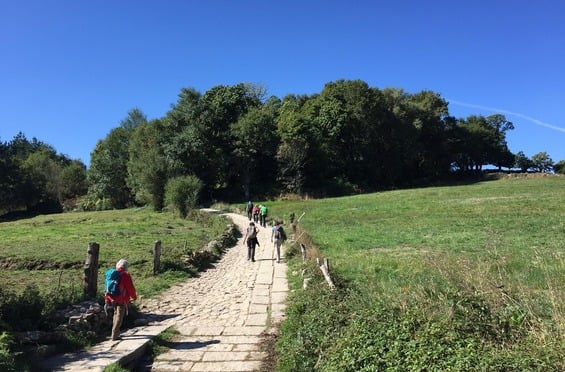Search
Living the Jubilee as Pilgrims
-
 July 18, 2025As we journey through this Jubilee Year, the Church invites us to walk as “Pilgrims of Hope.” But what does this mean? St. Paul offers insight, writing:
July 18, 2025As we journey through this Jubilee Year, the Church invites us to walk as “Pilgrims of Hope.” But what does this mean? St. Paul offers insight, writing:
“Not only that, but we even boast of our afflictions, knowing that affliction produces endurance, and endurance, proven character, and proven character, hope, and hope does not disappoint, because the love of God has been poured out into our hearts through the holy Spirit that has been given to us” (Rom 5:3 - 5).
St. Paul portrays life as a journey shaped by trials, but through them, we are filled with a hope born of the Holy Spirit. In this Jubilee Year in which we are called to be pilgrims of hope, it is advantageous to reflect on this most important of virtues.
Christian hope is distinguished from optimism or wishful thinking. Unlike optimism, which rests on positive outcomes, Christian hope is rooted in the person of Christ and the certainty of God’s promises. It is “the theological virtue by which we desire the kingdom of heaven and eternal life as our happiness, placing our trust in Christ’s promises and relying not on our own strength, but on the help of the grace of the Holy Spirit” (Catechism of the Catholic Church, no. 1817). An important key in this definition is that hope is, above all, a theological virtue, a gift of God that is infused in the soul, elevating and directing all our small hopes, sublimating them, and orienting them toward their proper end, which is heaven.
In some way, we could relate our Christian pilgrimage of hope to the Camino de Santiago in Spain. Many people make this walk either as a pilgrimage of faith or when facing a decision point in their lives. Think, for instance, of the disciples on the road to Emmaus who “were hoping that (Jesus) would be the one to redeem Israel” (Lk 24:21), bringing all their heaviness of heart and dashed ‘hopes’ with them in their knapsacks. In our pilgrimage, we often bring with us a sack full of hopes, desires, and sorrows. In all cases, the Camino becomes a kind of pilgrimage of hope.
To be a true pilgrimage, though, it must have a destination. We are not in this world to hang around and whittle away the hours. A true pilgrim of hope walks with purpose because we have the goal in mind. In the case of the Camino, the city of Santiago de Compostela comes to represent our heavenly Homeland. Someone once described the Camino as at once a “looking forward” and at the same time a “leaving behind.” There is the excitement of getting closer to the end of the journey and the wonder of what’s over the next hill or around the next corner, while at the same time, every bridge that is crossed, every town that is passed through involves a “leaving behind.” St. Paul described this beautifully in his letter to the Philippians (3:13b-14): “Just one thing: forgetting what lies behind but straining forward to what lies ahead, I continue my pursuit toward the goal, the prize of God’s upward calling, in Christ Jesus.” As pilgrims of hope, we are striving with purpose toward the goal of holiness, which requires us to look forward in hope and, at the same time, leave behind all that might hinder us. Still, we carry with us all who walk with us on this journey as well as the memories of all the good that has been heaped upon us.
There is no doubt that we will encounter difficulties and obstacles. Hope then is “a weapon that protects us in the struggle of salvation … and is the ‘sure and steadfast anchor of the soul … that enters … where Jesus has gone as a forerunner on our behalf’ (Heb 6:19-20)” (CCC no. 1820). If we see the difficulties that come our way in this light and place our hope in the promises of Christ, we will be able to persevere to the end, keeping our eyes fixed on Jesus.
In this Jubilee Year, let each of us become a true pilgrim of hope—walking with purpose, enduring with joy, and carrying the light of Christ into the world. “Let us hold unwaveringly to our confession that gives us hope, for he who made the promise is trustworthy” (Heb 10:23). Let us, finally, beseech the Mother of God, “our life, our sweetness, and our hope” (Salve Regina) to help us to be worthy of the promises of Christ, our sure and certain hope.
